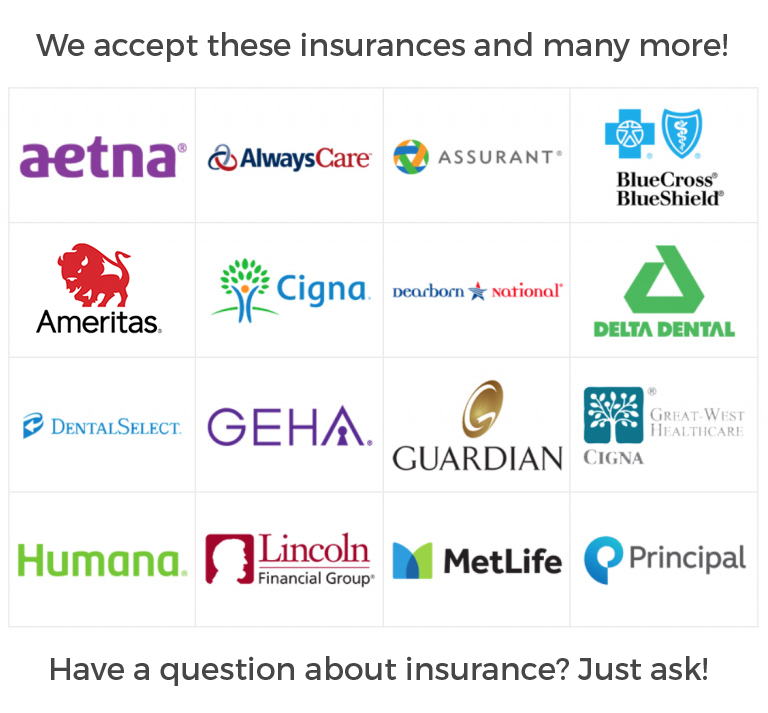Preventive Dentistry
General & Preventive Dental Care
Keeping smiles whole and healthy for life is always our top priority. That starts with regular dental checkups every six months at our Peoria dentistry practice, but we also offer a number of other preventive treatments like dental sealants and sleep apnea therapy to keep our patients and their smiles healthy. Contact the friendly Nice Nice Dental Care team to find out more or schedule your preventive dentistry checkup today. We welcome patients from Peoria, AZ and other surrounding communities.
Checkups & Cleanings
Checkups at our office include diagnostic x-rays, thorough clinical evaluations, professional teeth cleanings, and a face to face consultation with one of our skilled, passionate dentists in order to help patients keep their whole, healthy smiles for life. These regular appointments allow our team to become familiar with patients’ smiles, prevent many common oral health concerns, and diagnose and treat others in their earliest stages allowing us to offer conservative treatment options. Our comprehensive checkups encompass the following treatments:
- Diagnostics – we use state-of-the-art digital x-rays and intraoral photography to get a complete picture of patients’ internal and external dental structures
- Examinations – Dr. Dhari & Dr. Rasha carefully examine patients teeth, gums, and other oral structures in order to screen for common oral health concerns including tooth decay, gum disease, temporomandibular joint (TMJ) dysfunction, bruxism (teeth grinding and clenching), and oral cancer
- Cleanings – Our skilled hygienists carefully remove plaque and tartar from every surface of teeth, explain and demonstrate best practices in at-home hygiene, answer your questions, and make product recommendations
- Consultations – Dr. Dhari & Dr. Rasha carefully explain the findings of your diagnostics and visual examination, answers questions, and partners with patients to create a plan for ongoing oral health care that meets patients’ needs and helps them keep their beautiful smiles for a lifetime
Oral Cancer Screening
While many patients believe that only those patients who use tobacco products need to receive oral cancer screenings, research has shown that more than 25% of those diagnosed with oral cancer do not engage in any of the high risk behaviors associated with the disease. In the US, one person every hour dies from oral cancer, and more than half of those patients diagnosed each year will not live more than five years beyond diagnosis. According to research conducted by the Oral Cancer Foundation, the best way to reduce the number of annual deaths attributed to oral cancer is by diagnosing and treating the disease in earlier stages. That’s why we screen for oral cancer using the Identafi system as part of every six month checkup.
Dental Sealants
Dental sealants are thin layers of plastic that coat teeth preventing bacteria from accessing the smile, forming plaque, and potentially causing tooth decay or gum disease. This simple, painless treatment can be completed quickly during any regular checkup. We apply a layer of liquid sealant to teeth and harden the clear, protective coating to teeth with the curing light we use to complete composite resin fillings. Once in place, dental sealants fill in even the tiniest pits and cracks in teeth and protect smiles from potential damage for years with proper care.
Nightguards for Bruxism
Patients who grind and clench their teeth at night, a condition known as bruxism, may find it difficult to stop this potentially damaging habit, but we offer a simple solution to protect smiles from wear. Custom crafted mouthguards reposition the jaw allowing it to rest in its most comfortable position, and they place a barrier between rows of teeth. By repositioning the jaw, these nightguards decrease the incidents of grinding which may occur due to an uncomfortable bite, and the barrier between teeth protects them from wearing, chipping, or cracking that may occur due to bruxism.
TMJ Therapy
One of the potential adverse effects of bruxism is TMJ dysfunction. TMD can also occur due to stress, facial trauma, and a variety of other issues. Regardless of the cause of TMD, we offer diagnosis and occlusal splint therapy for this common oral health issue. Let Dr. Wingar know right away if you experience any of the following side effects of TMJ:
- Jaw pain
- Limited jaw mobility
- Popping or grinding sound when opening and closing the mouth
- Chronic headache, earache, or neck pain
Sleep Apnea Therapy
Sleep apnea is the cessation of breathing for ten or more seconds at a time multiple times during sleep. Most patients don’t immediately think of the dentist when they’re diagnosed with sleep apnea, but as a specialist with training in how the oral and maxillofacial structures interact, dentists may be able to provide effective treatment for those patients with obstructive sleep apnea, the most common form of this sleep disorder. We create oral appliances that shift the jaw forward keeping the airway clear and preventing incidences of apnea and allowing patients to sleep soundly.
Fluoride Treatment
Many cities have been fluoridating water in order to improve the development of strong, healthy teeth, but once teeth erupt from the gum line, topical fluoride is necessary to strengthen teeth. Most patients receive adequate fluoride from toothpastes and mouth rinses, but for young patients who are still learning to care for their smiles and adults who are more prone to decay, we offer professional grade topical fluoride treatments to fortify enamel protecting teeth from decay.
Toothpastes & Mouthwashes
We treat patients twice a year during in-office checkups and teeth cleanings, but we also want to help patients care for their smiles at home. We recommend a number of products that can dramatically improve home oral hygiene routines including the CTx CariFree system, the PerioSciences system, and Ice Chips. No product is right for every patient, and we make recommendations based on our patients’ unique set of oral health care needs.
Comprehensive Exams and Cleanings for Better Oral Health!
Many people don’t realize that dental checkups and cleanings are about more than just getting tartar removed and X-rays performed. While these are key tenets of our routine appointments, they’re also meant to help you stay protected against underlying disease you may not have otherwise been aware of. This is the case even if the condition isn’t directly related to your oral health! Furthermore, you should always feel comfortable asking your dentist questions whenever you’re unsure of something. Contact us today to schedule your first visit at Nice Nice Dental Care!
How Technology Enhances Your Dental Care
In order to have a better understanding of what’s happening underneath gum and bone tissue, your children’s dentist in Peoria utilizes digital X-rays, the latest in X-ray technology. With it, she can catch problems that are often invisible to the naked eye. For example, X-rays help her examine the path of erupting permanent and wisdom teeth, which is especially important for younger patients.
In the event that you need a better explanation of your current oral health status, intraoral cameras keep patients fully informed during diagnostic procedures. These handheld cameras project live video of all the corners of the mouth onto a nearby screen, making it easier for dentists to express their determinations during exams.
The Dental Examination
Dental exams involve closely examining the teeth, gums and oral structures in order to catch early signs of dental disease, mainly tooth decay and gum disease. However, your dental team is also on the watch for debilitating diseases that would likely cause potential problems later, including oral cancer, temporomandibular joint disorder (TMD), and bruxism, also known as chronic teeth grinding.
In many cases, these conditions can have a lasting effect on your overall health, not just your oral health. Those with TMD are more likely to have issues sleeping or starting the day due to jaw pain, while those with bruxism are likely to experience enamel erosion, sensitivity and eventually tooth loss. Oral cancer claims the lives of approximately 10,000 people annually, but is largely preventable with routine dental visits.
A Truly Professional Cleaning
Finally, our skilled hygienists don’t just remove plaque and tartar from your teeth, but offer advice on the best way to protect your mouth in between your routine visits. They’ll recommend products they believe to be the most effective at protecting your oral structures.
Whether you’re an adult or child, you may also want to consider treatments that offer professional protection as well, including fluoride varnishes and dental sealants. These are ideal if we determine that you’re more susceptible to dental disease than other patients.
After disclosing our findings and completing your cleaning, Dr. Dhari & Dr. Rasha and his team always leaves time to answer questions you have and build a treatment plan that works best for you. After all, treating the source of your dental issue and preventing future issues is the most important step you can take in keeping your smile for life! Contact us today to schedule your routine dental checkup in Peoria with Nice Nice Dental Care!
Therapeutic Treatment for Sleep Apnea
Are you struggling to keep your eyes open during the day? Keeping your bed partner awake with loud, chronic snoring? Waking with dry mouth or headaches? If you answered yes to any of these questions, you may be suffering from sleep apnea.
This serious sleep disorder can cause a number of health concerns, and without treatment, sleep apnea can impact every aspect of your day to day life.
At Nice Nice Dental Care in Peoria, AZ, we work with patients to get an accurate diagnosis and plan for effective treatment. If you want to learn more about sleep apnea and the therapies available to you, call our Peoria, AZ dentist and dentistry team today. We’ll be happy to answer your questions or schedule an appointment for you to visit our team.
What is Sleep Apnea?
Sleep apnea is a disorder that causes patients to stop breathing for ten or more seconds at a time during sleep. There are two types of sleep apnea. Central sleep apnea is the rarer of the two forms.
It occurs when the brain fails to trigger the body to breath in and out during sleep. Obstructive sleep apnea is the more common form, and it occurs when the airway is physically obstructed during sleep.
Central sleep apnea needs to be treated with advanced services performed by a sleep doctor and other specialists. Our team offers treatment for those patients suffering from the more common obstructive sleep apnea.
Am I at Risk for Sleep Apnea?
Any patient at any age can suffer from sleep apnea, but some of the factors that increase your risk for this disorder include:
- Being male
- Being over the age of 50
- Having a neck circumference greater than 16 inches
- Having a BMI greater than 35 kg/m2
How Will I Know I Have Sleep Apnea?
In order to determine whether or not you are suffering from sleep apnea, you will need to complete a sleep study. Some of the warning signs of sleep apnea that indicate a need for this sleep test include:
- Loud, chronic snoring
- Excessive daytime sleepiness
- Waking gasping or wheezing
- Chronic morning headaches
- Waking with dry mouth or hoarse voice
- Difficulty concentrating
- Memory loss or difficulty recalling details
- Unexplained changes in mood or behavior
Why Should I Visit a Dentist for Sleep Apnea Therapy?
Many patients find it strange that dentists would offer sleep apnea therapy, but actually, this makes perfect sense. Dentists have advanced training in the way that the oral and facial structures interact. When patients are suffering from obstructive sleep apnea, a skilled dental practitioner can offer effective therapy to open the airway at night. The Nice Nice Dental Care team offers custom crafted oral appliances to keep the airway clear during sleep. Oral appliances are crafted to shift the jaw forward. This shift places pressure on the throat muscles to ensure the airway remains open and unobstructed through the night. For some patients, combining a custom oral appliance with the more traditional CPAP system improves the efficacy of treatments, ensuring patients sleep soundly and breathe deeply all night.
Are you suffering from sleep apnea in Peoria?
Poor quality of rest can change your day-to-day by affecting your productivity at work, ability to concentrate, and overall mood. An estimated 22 million people in the United States suffer from this condition, but nearly 80 percent of those patients are left undiagnosed, making them have to groggily skate through their everyday responsibilities. At Nice Nice Dental Care, we offer oral appliances to open your airway and improve your quality of rest. For your convenience, we’ve compiled some common questions we get about this sleeping disorder below.
Sleep Apnea FAQs
Will my dental or medical insurance cover an oral appliance?
Nowadays, most medical insurance companies are starting to recognize oral appliances as a therapeutic treatment to sleep apnea. Last year, over 50 percent of companies covered the procedure for patients with an obstructive sleep apnea diagnosis. Nowadays, this number has increased. It’s important to keep in mind that in order for your insurance to cover your treatment, you must have a sleep study done and professional diagnosis.
The best way to find out if your dental or medical insurance providers will help cover the cost of an oral appliance is to contact them directly. Our team at Nice Nice Dental Care would be more than happy to help you do this.
How is sleep apnea diagnosed?
To receive an official diagnosis, you’ll need to visit a certified sleep specialist. They’ll request a sleep study, which is an overnight evaluation where they’ll examine your breathing patterns and body function throughout the evening. Some specialists even offer at-home testing as well.
If they determine that you have obstructive sleep apnea, they may refer you to other specialists to rule out that there is any issue with your nose or throat. Once you’ve received your final results, you can visit our practice to receive sleep apnea treatment in Peoria.
What happens if I don’t treat my sleeping disorder?
If you suffer from sleep apnea, it can impact how you function in your daily life and even cause several additional health problems. Without the proper treatment, you could experience:
- Mood swings
- Depression
- Heart attacks
- High blood pressure
- Stroke
- Heartburn
- Gastroesophageal reflux
- Impaired concentration
Paired with chronic fatigue, these effects can make it dangerous to complete daily tasks like driving to work. After you receive a diagnosis, all it takes is a couple of visits to our practice, and we’ll be able to improve your quality of life in no time.
What are the advantages of oral appliance therapy over using a CPAP?
Most patients choose oral appliance therapy to stop snoring in Peoria over CPAP because it’s effective, non-invasive, and easily incorporates into anyone’s lifestyle. Some other ways that patients can benefits include:
- Comfort
- Easy to use
- Quiet
- Portable
- Easy to maintain
They’re similar to sleeping with a retainer and are custom fitted to your individual mouth. Not only is oral appliance therapy generally more convenient, but it can also improve the health of your heart, body, and mind.
Failing Implants? We Can Help
Dental implants will let you eat anything you want, stop your jawbone from deteriorating, and provide your new teeth with a strong, stable foundation; we highly recommend them if you ever find yourself with a gap in your grin. But while implant surgery has a success rate as high as 95%, there is a risk, however small, of failure. At Nice Nice Dental Care, we can locate and treat the cause of implant failure, giving us a chance to save your smile! Contact us today to schedule an appointment with Dr. Dhari & Dr. Rasha if you think your new teeth are suffering from complications.
Why Do Dental Implants Fail?
As rare as implant failure is, it can have a few different causes. One of the most common issues is a condition called peri-implantitis. When the gum tissue around the dental implant becomes infected, the bone underneath could break down. As result, the implant post becomes loose and might even de-attach from the jawbone altogether.
If you smoke or have diabetes, your odds of implant failure will be higher than normal. This is because they impede the body’s ability to heal itself; osseointegration (the process of the implant becoming one with the bone) depends entirely on the mouth healing properly.
What are the Symptoms of Failed Dental Implants?
Just as there are different reasons for an implant failing to join properly with your jaw, there are also different signs that such failure has occurred. In many cases, you’ll experience a radiating pain in the area around the implant post. If there’s an infection, you’ll probably see red or inflamed gums. Also, any difficulty chewing or biting could mean that your tooth is not as secure as it should be. Finally, if you can wiggle the implant post even slightly, it’s a sure sign of an issue that needs to be addressed as quickly as possible.
Keep in mind that implant failure can occur shortly after the surgery or several years later.
- Early Dental Implant Failure: Remember that there’s a difference between normal discomfort caused by surgery and the radiating discomfort caused by implant failure. If your pain lasts for more than a few days or grows worse, it’s better to be safe than sorry and call us right away.
- Late Dental Implant Failure: If your implant pain returns long after the procedure, or if you suddenly have trouble chewing foods that never gave you trouble before, you should consider it a possible sign of implant failure.
How Does Dental Implant Salvage Work?
The first step is to examine the implant site and take X-rays of your mouth in order to narrow down exactly what’s wrong with your implants. After that, we can start planning your treatment, which will be different depending on the source of your implant failure. For example, if the gums have been infected, we may be able to leave the implant in place while reducing bacteria levels with antibiotics and good oral hygiene. On the other hand, if a significant amount of bone has been lost, we’ll likely need to perform an advanced procedure such as bone grafting to help the jaw regenerate. In these cases, the implant might have to be removed. Once your mouth is healthy again, our dentits may be able to try and place a new implant.
Meet Your Award Winning Dentists
The Proof is in Our Patients

MOST INSURANCES WELCOME AND MAXIMIZED!
Contact us and schedule your visit today.
Most Insurances Welcomed and Maximized
We’ll make the process of paying for your dental care as simple as possible! Our office accepts a wide variety of insurance plans, and we’re always happy to file your claim for you so that you can be sure to receive the maximum benefits available to you. Nice Nice Dental Care is in network with Delta Dental, Cigna, Metlife, Aetna, Guardian, Ameritas, Principal, United Healthcare, United Concordia, Assurant, GEHA, Careington, Humana, TDA, BlueCross BlueShield and more! Call us today to find out how we can maximize your insurance plan!

OUR LOCATION
Nice Nice Dental
| Monday | 7:30AM – 4:00 PM |
| Tuesday | 8:30 AM – 5:00 PM |
| Wednesday | 8:30 AM – 5:00 PM |
| Thursday | 7:30 AM – 4:00 PM |




